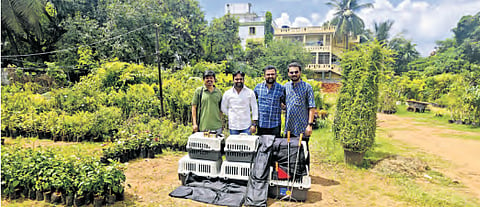

Collectively channelising their expertise, seven individuals, each hailing from diverse backgrounds but united by a shared passion for conservation, have come together to form Wildlife Conservation Through Research and Education (WCTRE). This non-profit and nongovernmental organisation is dedicated to raising public awareness about the preservation and conservation of India’s diverse habitats through research and education, as reflected in its name.
With a foundation rooted in research and a wealth of experience in wildlife conservation, the members of WCTRE aim to educate individuals about the significance of their natural surroundings through simple techniques and innovative awareness initiatives.
In 2020, Vivek N Rathod (a contractor), Sanjay K (associated with Amazon), Gnaneswar Ch (from MCBT), Bhagyasree Venugopal (an aviation ornithologist), Chetan Vidya (from CIFT), Avinash Ch (a wildlife documentarian), and Shanmukesh Dadi (a software engineer) co-founded WCTRE. Despite each member’s extensive experience of over a decade in wildlife conservation and documentation, it was during the Covid-19 pandemic that they formalised their efforts by setting up WCTRE as a physical manifestation of their commitment to fieldwork. Among the co-founders, Vivek, Sanjay, Chetan, Gnaneswar, and Avinash are rescuers for the AP Forest Department.
WCTRE conducts detailed studies on reptile nesting habits and habitats to aid in their conservation. “We collaborate with communities and engage in community development to mitigate threats to marine biodiversity. Addressing urban biodiversity issues is another priority, achieved through impactful initiatives. Moreover, WCTRE runs capacity-building programmes in schools and colleges. We also celebrate environmental days with unique programmes tailored for the public,” stated Vivek.
To date, their efforts have resulted in the rescue of over 300 snakes in response to distress calls, over 200 birds, and more than 50 mammals. They have conducted data collection expeditions to over 50 lakes and reservoirs. “In this era of rapid urbanisation, prioritising conservation and preservation is crucial. Equally vital is the involvement of local communities in understanding and protecting their surroundings. To achieve this, we at WCTRE organise regular nature walks, guided tours, awareness campaigns, birdwatching activities, and other such activities to engage and educate individuals about their environment,” said Vivek. The WCTRE also places emphasis on data collection, utilising citizen science projects as essential tools for documenting biodiversity. These initiatives engage volunteers in scientific research and data collection efforts, empowering locals to steward their environment. By involving residents in data collection and analysis, WCTRE aims to deepen understanding of surrounding ecosystems and contribute to scientific records. The data is uploaded to platforms like iNaturalist, where users can submit observations to global databases used for research and conservation efforts. According to data from iNaturalist, the project ‘Sharks, Rays, and Skate Landing in AP’ has observed 41 species. The project ‘Reptiles and Amphibians of AP’ has catalogued 113 species. ‘Biodiversity of Srikakulam’ encompasses 414 species. ‘Biodiversity of Vizianagaram’ contains 751 species. ‘Biodiversity of Vizag’ showcases an impressive 2,688 recorded species. For interested individuals who want to volunteer with WCTRE, contact: 6262344922.
NGO ENGAGED IN KEY AREAS OF CONSERVATION
WCTRE is engaged in several key areas of conservation works. Their efforts include the preservation of avifaunal habitats both within and outside the State. They focus on the conservation of water bodies through community-based awareness programmes